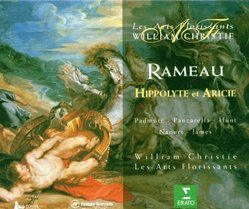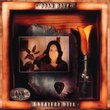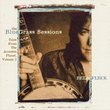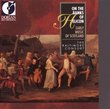| All Artists: Jean-Philippe Rameau, William Christie, Les Arts Florissants, Mark Padmore, Lorraine Hunt Lieberson, Laurent Naouri, Anna Maria Panzarella, Nathan Berg, Paul Agnew, Patricia Petibon Title: Rameau - Hippolyte et Aricie / Padmore, Panzarella, Hunt, Naouri, E. James, Petibon, Mechaly, Delunsch, Les Arts Florissants, Christie Members Wishing: 0 Total Copies: 0 Label: Erato / Warner Music Release Date: 3/18/1997 Album Type: Box set Genre: Classical Styles: Opera & Classical Vocal, Historical Periods, Baroque (c.1600-1750) Number of Discs: 3 SwapaCD Credits: 3 UPC: 706301551721 |
Search - Jean-Philippe Rameau, William Christie, Les Arts Florissants :: Rameau - Hippolyte et Aricie / Padmore, Panzarella, Hunt, Naouri, E. James, Petibon, Mechaly, Delunsch, Les Arts Florissants, Christie
 | Jean-Philippe Rameau, William Christie, Les Arts Florissants Rameau - Hippolyte et Aricie / Padmore, Panzarella, Hunt, Naouri, E. James, Petibon, Mechaly, Delunsch, Les Arts Florissants, Christie Genre: Classical
|
Larger Image |
CD DetailsSimilarly Requested CDs
|
CD ReviewsThis is the one to have hcf | 11/25/1999 (5 out of 5 stars) "As you know, there are two historically informed recordings of Hippolyte: the Minkowski and the Christie. There is also an older recording (not a period performance) with Janet Baker and John Shirley-Quirk, but that one's been out of print for years. I also have a CD in which the great Placido Domingo bellows Ah! Faut-il, but I will spare you my complaints about how "inauthentic" it sounds. For a genuinely authentic Hippolyte, listen to this recording. As far as the role of Hippolyte goes, it is difficult to choose between the Minkowski and the Christie. I'm a big fan of both Jean-Paul Fouchecourt's and Mark Padmore's, although, having listened to them in numerous other recordings, I must say that as Hippolyte neither turns in the performance of his career. However, both are splendid stage actors (speaking from a firsthand experience), so if you notice an occasional vocal flaw in the relatively disembodied atmosphere of a studio recording, I guarantee you, you wouldn't notice it if you were watching these singers live. Tenors aside, I prefer the Christie. He chooses the first, the original, version of Hippolyte, while Minkowski opts for the second remake. The difference is the most evident in the stunning second act - the descent of Tesee into the underworld. Les Arts Florissants as an ensemble, headed by a haute-contre Tisiphone, are much more expressive in this scene, than the Minkowski group. Christie really knows how to make these underworld scenes unfogettable: witness his skill in the invocation of evil spirits in Medee or his poignant rendition of Charpentier's La Descente d'Orphee aux Enfers. Laurent Naouri as Tesee is incomparable in Puisque Pluton, aided by Christie's imaginative split-second pauses in the flow of the aria. Then there is Lorraine Hunt. The divine Lorraine Hunt, whose luscious and tart voice is so conducive to the expression of love and anquish that permeate both Rameau's Hippolyte and Charpentier's Medee (another of her signature roles). Minkowski's Phedre is great in all respects, but Lorraine Hunt is in the league of her own. Christie's Hippolyte won Gramophone Best Early Opera Award in 1997 and the Cannes Classical Award in 1998. Minkowski's Hippolyte was also recognized: it won a Gramophone award nomination. You owe it to yourself to buy one of these recordings - or both!" Don't miss this one!!!!! J. Luis Juarez Echenique | Mexico City | 10/13/1999 (5 out of 5 stars) "Jean Philippe Rameau is the greatest French composer. His music reflects the wisdom and taste of the Age of Enlightenment. He composed his first opera when he was already 50 years old, so all his stage works show the maturity and confidence of a great artist. His music is very demanding, but I am sure you will agree with me that the extra effort pays enormous dividends. This recordings is a gem, all the singers are admirable, and the orchestra and chorus quite simply matchless. But it is the genius of William Christie who takes center stage, his pacing and understanding of the French Baroque is glorious. His Rameau conducting is on a par with Furtwangler conducting Wagner or Toscanini conducting Verdi, if you miss this sensational recording, you will be very, very sorry." A work to possess. hcf | 06/17/1999 (5 out of 5 stars) "If there was one opera work by Rameau to own, this lyric tragedy is THE one. Two characters are worth every praise: Phèdre and Thésée. Naouri in his exceptional aria "Puisque Pluton" is such a moving character, cursed to kill his own son with the help of gods (well not quite so, but he is not supposed to know). The aria in itself is a master work by Rameau (I believe it is his first official opera at an old age, whereas he always wanted to create one). And of course, "Quelles plaintes en ces lieux m'appellent?" is a scene to listen to till the end of times. Lorraine Hunt (with her mezzo/soprano voice) is a woman in fury, so proud to be the daughter of the Sun, so wounded by Love, trapped into her fantasies and acts. Just as Christie has written it, I have listened to this scene time and time again..."
|

 Track Listings (22) - Disc #1
Track Listings (22) - Disc #1







